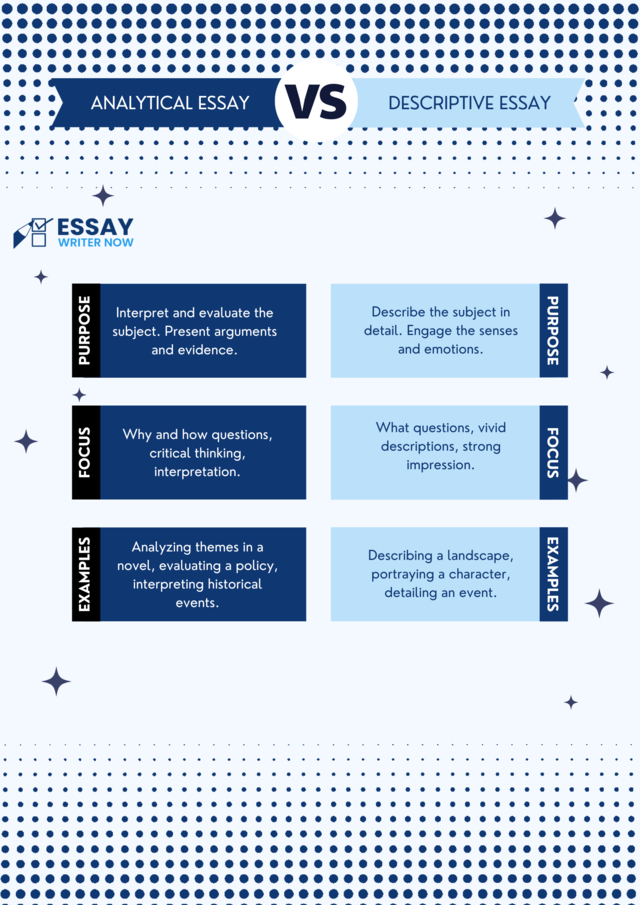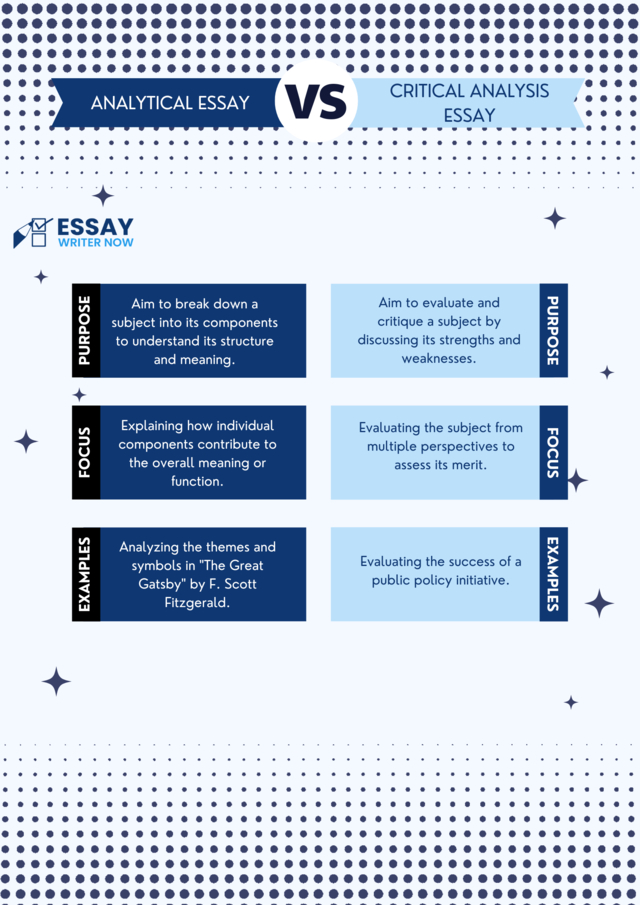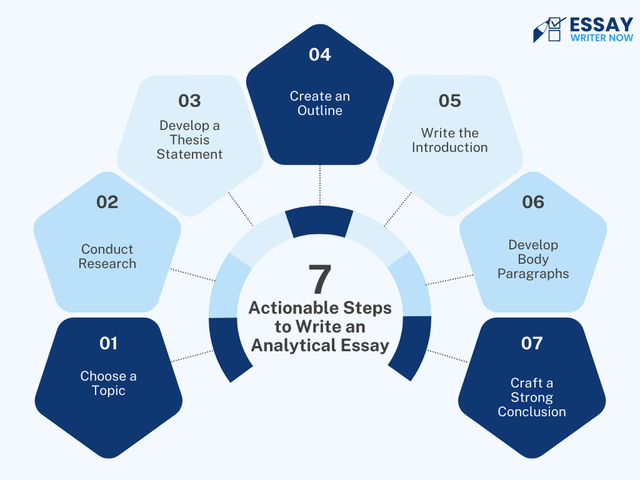What is an Analytical Essay?
Analytical essays involve examining and interpreting a specific piece of literature, event, or other subject matter. They require breaking down the topic into its fundamental parts, discussing how these parts work together, and evaluating their effectiveness.
Analytical essays are one of different types of essay that goes beyond mere summarization, critically discussing the 'how' and 'why' aspects to provide a deeper understanding.
Analytical Essays Vs. Descriptive Essays: What’s The Difference?
In a nutshell, here is the difference between an analytical and descriptive essay:

Analytical Essays Vs. Critical Analysis Essays: How Do They Differ?
Here is the main difference between an analytical and a critical analysis essay:

Types of Analytical Essays
Here are some of the most common types of analyticals essays that you may be asked to write on:
Literary Analysis
A literary analysis essay examines a piece of literature to understand its themes, characters, and literary devices.
| For instance, an essay analyzing Shakespeare's "Hamlet" might explore the theme of revenge, the complexity of Hamlet's character, and the use of soliloquies to reveal inner thoughts. |
Rhetorical Analysis
A rhetorical analysis essay evaluates how an author or speaker uses language and rhetorical strategies to persuade or inform an audience.
| For example, an essay analyzing Martin Luther King Jr.'s "I Have a Dream" speech might focus on his use of repetition, metaphors, and emotional appeals to inspire and motivate listeners. |
Process Analysis
A process analysis essay explains the steps or stages of a process, often used in technical writing or instructional content.
| For example, an essay detailing the process of baking a cake might describe the steps from gathering ingredients to mixing and baking, providing clear instructions and tips for success. |
Cause and Effect Analysis
A cause and effect analysis essay investigates the causes of a particular event or situation and its effects or consequences.
| For instance, an essay on the causes and effects of climate change might explore factors such as greenhouse gas emissions and deforestation, and their impact on global temperatures, sea levels, and weather patterns. |
Comparative Analysis
A comparative analysis essay compares and contrasts two or more subjects to highlight their similarities and differences.
| For example, an essay comparing online and traditional education might examine aspects such as accessibility, cost, and learning outcomes. |
How to Write an Analytical Essay in 7 Steps

Here are 7 steps you can follow to write an analytical essay:
Choose a Topic
Select a focused thesis topic or statement that you can analyze effectively. Ensure your topic is specific enough to allow for in-depth analysis rather than being too broad or too narrow.
Example:
| The portrayal of mental illness in Sylvia Plath's poetry. |
Conduct Research
Gather relevant sources and materials to support your analysis. Use academic journals, books, credible websites, and other resources that provide evidence and perspectives related to your topic.
Example:
Gather sources such as:
|
Develop a Thesis Statement
Formulate a clear and concise thesis statement that outlines the main argument or analysis of your essay. Your thesis should be specific and debatable, guiding the direction of your analysis.
Example:
| Sylvia Plath's poetry effectively portrays the complexities of mental illness through vivid imagery and introspective narratives, challenging societal norms and perspectives on mental health. |
Create an Outline
Organize your ideas and evidence logically by creating an outline. A typical analytical essay outline includes an introduction (with the thesis statement), body paragraphs (each focusing on a different aspect or evidence), and a conclusion.
Example:
Introduction
Body Paragraphs
Conclusion
|
Write the Introduction
Here are some steps that you can follow to write the introduction:
Hook Your Reader: Begin with an engaging hook sentence that captures the reader’s interest. This could be a provocative question, a surprising fact, a relevant quote, or a brief anecdote related to the topic.
Introduce the Topic: Provide some background information to give context to your analysis. This helps the reader understand the significance of the subject and what to expect in the essay.
Present Your Thesis Statement: The thesis statement is the central argument or claim of your essay. It should be clear, concise, and specific, outlining the main points you will discuss in the body paragraphs.
Outline the Structure: Briefly mention the main points or arguments you will cover in the essay. Your essay outline gives the reader a roadmap of what to expect.
Example:
| Sylvia Plath, celebrated for her confessional poetry, explores the theme of mental illness with striking clarity in her literary works. This essay examines how her poetry and prose candidly depict her personal struggles and confront prevailing societal perceptions of mental health. |
Develop Body Paragraphs
Here are some steps you can follow to develop body paragraphs:
Use Topic Sentences: Each paragraph should start with a topic sentence that introduces the main idea of the paragraph. This helps to keep your writing organized and focused.
Provide Evidence: Use textual evidence, such as quotes, examples, and facts, to support your analysis. Make sure to explain how the evidence relates to your thesis and the point you are making in the paragraph.
Analyze the Evidence: Don’t just present evidence; analyze it. Explain the significance of the evidence and how it supports your argument. Discuss any patterns, themes, or implications that arise from the evidence.
Transition Between Paragraphs: Use transitional sentences or phrases to link your ideas and maintain a smooth flow in your writing. This helps the reader follow your argument more easily.
Develop Each Point Thoroughly: Ensure that each paragraph focuses on a single idea and develops it fully. Avoid introducing multiple ideas in one paragraph, as this can confuse the reader.
Example:
| In "Ariel," Plath's use of visceral imagery, such as the metaphor of the horse in "Lady Lazarus," vividly illustrates the internal turmoil of mental illness. … |
Craft a Strong Conclusion
Here are some steps you can use to write a conclusion for your analytical essay:
Restate Your Thesis: Begin the conclusion by restating your thesis in different words. This reminds the reader of your main argument and reinforces its significance.
Summarize Main Points: Briefly summarize the key points you made in the body paragraphs. This helps to reinforce your argument and remind the reader of the evidence you presented.
Discuss the Implications: Explain the broader implications of your analysis. What can be learned from your argument? How does it contribute to a deeper understanding of the topic?
Provide a Closing Thought: End with a final thought or call to action that leaves a lasting impression on the reader. This could be a thought-provoking question, a prediction, or a recommendation related to the topic.
Avoid Introducing New Information: The conclusion is not the place to introduce new arguments or evidence. Keep the focus on summarizing and reinforcing the points you have already made.
Example:
| Sylvia Plath's profound exploration of mental illness through her poetry not only sheds light on her personal struggles but also invites readers to reconsider conventional attitudes towards mental health, making her work timeless in its relevance. |
Ideal Analytical Essay Structure
Here is a sample structure of how an ideal analytical essay should look like:
Title: The Impact of Social Media on Modern Communication I. Introduction
II. Body Paragraphs A. Transformation of Interpersonal Relationships
B. Influence on Business Practices
C. Dissemination of Information
III. Counter Arguments
IV. Conclusion
|
Analytical Essay Topics
Here is a list of analytical essay topics that may contain a perfect topic that you can use:
- The impact of social media on interpersonal relationships.
- Analyzing the effectiveness of vaccination campaigns in public health.
- The portrayal of mental illness in contemporary cinema.
- Analyzing the economic factors behind the rise of gig economy platforms.
- The role of artificial intelligence in transforming customer service industries.
- Analyzing the environmental impact of fast fashion.
- The evolution of feminist discourse in literature over the past century.
- Analyzing the factors contributing to income inequality in urban centers.
- The ethical implications of genetic engineering technologies.
- Analyzing the cultural significance of traditional ceremonies in indigenous communities.
Analytical Essay Examples
Here are some examples that you can use as a reference point when writing your analytical essay.
Why Students Are Asked to Write Analytical Essays
Analytical essays serve as a good teaching medium to:
Develop Critical Thinking Skills
Writing analytical essays helps students develop critical thinking skills. By analyzing various elements and their relationships, students learn to approach topics methodically and thoughtfully.
Improve Writing Proficiency
These essays enhance writing proficiency. Students must articulate their thoughts clearly and cohesively, using evidence to support their arguments. This practice hones their ability to communicate complex ideas effectively.
Encourage Research and Evidence-Based Arguments
Analytical essays encourage thorough research and the use of evidence. Students learn to gather relevant information, evaluate sources, and incorporate factual data to substantiate their claims.
Enhance Understanding of Subject Matter
Writing analytically deepens students' understanding of the subject matter. By examining the finer details and underlying themes, students gain a more comprehensive perspective.
Why Your Analytical Essay Should Impress Readers
The real goal of your analytical essay is to:
Demonstrate Mastery of the Subject
A well-crafted analytical essay demonstrates your mastery of the subject. It shows that you have a thorough understanding and can engage with the material on a deeper level, which can impress your instructor or any other reader.
Stand Out in Academic Settings
In academic settings, standing out is crucial. An impressive analytical essay can distinguish you from your peers, showcasing your ability to think critically, write proficiently, and present well-reasoned arguments.
Foster Intellectual Curiosity
Engaging deeply with a topic through analytical essays fosters intellectual curiosity. By exploring different perspectives and questioning assumptions, students develop a habit of lifelong learning and a passion for discovery that extends beyond the classroom.
Enhance Problem-Solving Abilities
Writing analytical essays enhances problem-solving abilities. By dissecting complex issues and identifying key components, students learn to approach problems systematically and develop well-reasoned solutions. This skill is invaluable in both academic and real-world scenarios.
Build a Strong Academic Foundation
Crafting impressive analytical essays builds a strong academic foundation. Mastery in this area can lead to success in other academic tasks, such as research projects, presentations, and even exams. The analytical skills and disciplined approach developed through essay writing lay the groundwork for academic excellence across disciplines.
Wrapping Up!
Analytical essays help students like yourself explore topics extensively and improve your critical thinking skills. By breaking down subjects such as literature or social issues, you not only enhance your ability to analyze but also to communicate complex ideas clearly.
Each step—from choosing a topic to refining your final draft—teaches you a systematic approach to learning and writing. Ultimately, a well-crafted analytical essay not only impresses with its depth but also contributes meaningfully to academic discussions and understanding.


